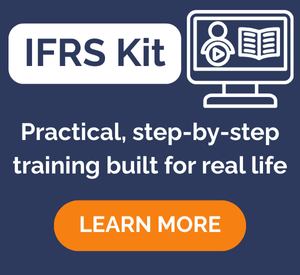Revenue under different Incoterms (EXW, DAP)
Question
Our company sells goods to the wholesalers and other distributors. The individual contracts contain different Incoterms, such as as EXW or DAP.
Does the recognition of revenue depend on the specific Incoterm?
Answer
Incoterms are pre-defined commercial terms of sales and they relate to clear communication of various tasks, costs and risks associated with the transport of goods from the supplier to the customer.
As each Incoterm represents different way of shipping goods and taking over the risks associated with the goods, the answer is YES, you should always consider specific Incoterm when accounting for revenue.
The reason is that the revenue is recognized when control of the goods is transferred to the customer and this moment depends on Incoterms, too, for example:
- EXW means Ex Works and in this case, the seller makes goods available at their premises and the buyer bears the costs and risks associated with the transport of goods to the buyer’s place.
In this case, the control is transferred right at the seller’s premises and the revenue is recognized at that point.
- DAP means Delivered At Place and in this case, the seller delivers the goods to the named place defined by the buyer and carries the risk associated with the transport up to that place.
Here, the control is transferred at the named place and the seller can recognize revenue only when that point is reached.
Example
ABC is a food producer and sells its products at different Incoterms. At the end of 20X1, it makes the following transactions with the clients:
- Sale of 1 000 sugar packs, price EWX = CU 1 per pack, the products picked up by the client on 31 December 20X1;
- Sale of 1 000 sugar packs, price DAP client’s warehouse = CU 1.30 per pack, the products left warehouse and were loaded on the truck on 31 December 20X1. The truck reached the place of delivery on 2 January 20X2.
In both cases, carrying amount of inventories was CU 800.
Here, both packages left warehouse on 31 December 20X1, but ABC must take care of Incoterms and see when the control passed to the buyer:
- EXW
At EXW, the client takes the package in the ABC’s warehouse and the control of goods passes to the client on 31 December 20X1. The journal entry is:-
Debit Trade receivables: CU 1 000
-
Revenue from sales of goods: CU 1 000
Accordingly, the goods are removed from inventories and are recognized as cost of sales:
-
Debit Cost of sales: CU 800
-
Credit Inventories: CU 800
-
- DAP client’s warehouse
At DAP, ABC takes responsibility for delivering goods to agreed place and as a result, control of goods passes to the customers at its warehouse. ABC controls goods during the transportation.
As a result, on 31 December, the revenue is not recognized, but the goods are removed from the warehouse to goods in transit:-
Debit Goods in transit: CU 800
-
Credit Inventories: CU 800
On 2 January 20X2, when the client takes goods, the revenue is recognized:
-
Debit Trade receivables: CU 1 300
-
Revenue from sales of goods: CU 1 300
Accordingly, the goods are removed from inventories and are recognized as cost of sales:
-
Debit Cost of sales: CU 800
-
Credit Goods in transit: CU 800
-
JOIN OUR FREE NEWSLETTER AND GET
report "Top 7 IFRS Mistakes" + free IFRS mini-course
Please check your inbox to confirm your subscription.
2 Comments
Leave a Reply Cancel reply
Recent Comments
- Tan Chee Hong on Retention in construction contracts
- Ahumuza on Accounting for discounts under IFRS
- Saheed Kehinde on How to account for intercompany loans under IFRS
- hassan ali on IFRS 15 Explained: Full Guide on 5-step Model for Revenue Recognition + Free Journal Entries Template
- BiG4 on IAS 23 Borrowing Costs Explained (2025) + Free Checklist & Video
Categories
- Accounting Policies and Estimates (14)
- Consolidation and Groups (25)
- Current Assets (21)
- Financial Instruments (56)
- Financial Statements (54)
- Foreign Currency (9)
- IFRS Videos (74)
- Insurance (3)
- Most popular (6)
- Non-current Assets (56)
- Other Topics (15)
- Provisions and Other Liabilities (46)
- Revenue Recognition (27)
- Uncategorized (1)




with respect to CIF & DAP , What if the Freight Cost incurred by seller and charged in the invoice recovering the same, whether we can recognize of income the loading port.?
The confusion part is on the incoterm of CIF, in which the ownership (risk and reward [not the control as required by IFRS15]) is transferred at the port of the seller (i.e. the goods has passed the ship rail).
The income is recognized at the loading port, which is similar with that of FOB.